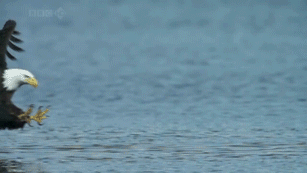Humans take the SUPER out of SUPERPREDATOR
We don’t hunt like the planet’s other carnivores, but that’s not such a good thing.

You may eat your baked halibut at a table with silverware while discussing important worldly matters, but you’re no less of a predatory animal than an orca or a cougar.
The way you hunt down your meaty fare, however, is much different than other carnivores. In a study published in Science today, scientists compared human hunters to 2,125 other predators across the planet and found that people are quite the outliers in how we catch our dinner. Most animals, be they otters catching crabs or sharks hunting seals, go after juveniles—the young, the slow, the weak. But we humans target adults—the big, the strong, the fertile—and in the ocean, we do it at rates 14 times higher than other marine predators.
In extreme cases, for a given prey species, we harvest 80 percent of the annual adult biomass out of the ocean. That doesn’t bode well for reproduction rates that might otherwise help replace what we’ve taken.
We’re weird on land, too. The only predators that make “trophies” of other top meat-eaters, humans hunt mature carnivores nine times more than other adult carnivores kill each other.

Then there’s the matter of how we do it. We’re the only hunters who have developed what lead author Chris Darimont dubs “wickedly efficient killing technology” like guns, hooks, and nets. We’re also the only predator to burn fossil fuels to power our hunting machines. For example, we find schools of fish by airplane and radio in their whereabouts to industrial fishing fleets waiting on the surface below. Vast transport systems then distribute the catch across the world. North Americans, for instance, eat shrimp from Asia and “sea bass” from Patagonia.
The authors argue that our hunting habits don’t only lead to extinctions—remember the passenger pigeon? Yeah, me neither—but they also could influence the evolution of prey species, as we select against the big, healthy individuals within a population.
The researchers suggest that to set things right, we should take a cue from other predators and tone it down. That’d be super.
This article was originally published on onEarth, which is no longer in publication. onEarth was founded in 1979 as the Amicus Journal, an independent magazine of thought and opinion on the environment. All opinions expressed are those of the authors and do not necessarily reflect the policies or positions of NRDC. This article is available for online republication by news media outlets or nonprofits under these conditions: The writer(s) must be credited with a byline; you must note prominently that the article was originally published by NRDC.org and link to the original; the article cannot be edited (beyond simple things such grammar); you can’t resell the article in any form or grant republishing rights to other outlets; you can’t republish our material wholesale or automatically—you need to select articles individually; you can’t republish the photos or graphics on our site without specific permission; you should drop us a note to let us know when you’ve used one of our articles.

Protecting Biodiversity Means Saving the Bogs (and Peatlands, Swamps, Marshes, Fens…)
How to Make an Effective Public Comment
From Dams to DAPL, the Army Corps’ Culture of Disdain for Indigenous Communities Must End